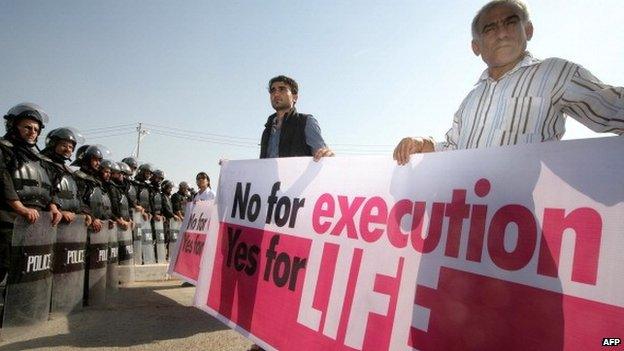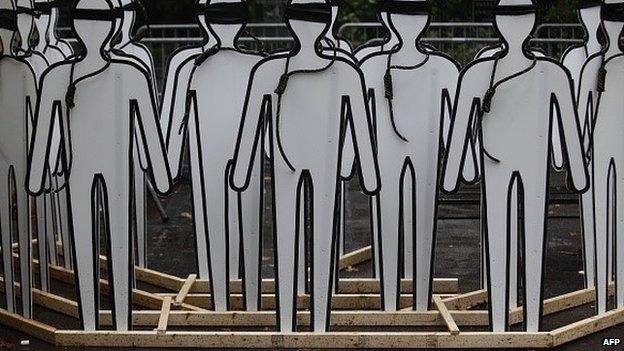Iran urged to halt execution of Kurd arrested as a minor
- Published

Protests have in the past been held outside Iran against the execution of Kurdish prisoners by Tehran
UN experts have joined human rights activists in calling on Tehran to halt the planned execution an Iranian-Kurdish man who was 17 when arrested.
Saman Naseem, 22, is set to be executed on Thursday in West Azerbaijan province for his alleged involvement in armed activities by a banned Kurdish party.
He was sentenced to death in 2013 after allegedly confessing under torture.
The UN experts said the execution of juvenile offenders was clearly prohibited by international law.
They also recalled repeated assertions by the Iranian authorities that confessions obtained under torture were inadmissible under Iranian law.
'Hung by feet'
Mr Naseem was arrested in July 2011 following a gun battle in the city of Sardasht between members of the Party of Free Life of Kurdistan (PJAK) and the Revolutionary Guards.
He alleges that he was held in a ministry of intelligence detention centre without access to his family or a lawyer, and tortured for 97 days before being forced, while blindfolded, to put his fingerprints on a false confession.
"During the first days, the level of torture was so severe that it left me unable to walk. All my body was black and blue. They hung me from my hands and feet for hours," he wrote in a letter seen by Amnesty International, external.

Cardboard cut-outs with nooses and blindfolds were placed outside the UN before a visit by Iran's President Hassan Rouhani in 2014
He added: "When I wanted to sleep during nights, they would not let me rest by making noises using different devices, including by constantly banging on the door. I was in a state between madness and consciousness."
Although he retracted the confession at trial and told the judge he was tortured, he was sentenced to death by a Revolutionary Court in January 2012 for "enmity against God" and "corruption on earth" for his membership of the PJAK and alleged involvement in its armed activities.
In August 2012, the Supreme Court overturned the death sentence and sent Mr Naseem's case for retrial on the grounds that he had been under 18 at the time of his arrest. However, he was again sentenced to death in April 2013 by a criminal court and the Supreme Court this time upheld his death sentence in December 2013
'State of injustice'
"Time is running out for Saman Naseem. The fact that Iran is willing to execute a man who was tortured to confess to a crime he is accused of having committed as when he was a child, shows the state of injustice in the country", Amnesty International's Hassiba Hadj Sahraoui said.
It was not too late to stop his execution and launch "a thorough judicial review of his case", she added.
The International Federation for Human Rights (FIDH) also demanded a halt to the execution and called for the death sentence against him to be overturned.
The UN experts expressed serious concerns over the increasing number of executions in Iran, including of women and political prisoners, and renewed their call on the government to immediately stop them.
More than 700 people, including 14 women and at least 13 juveniles, were believed to have been executed in 2014, they said. At least 60 people, including four women, have reportedly been executed in January alone, and a large number are currently at risk of execution.
- Published14 October 2024
